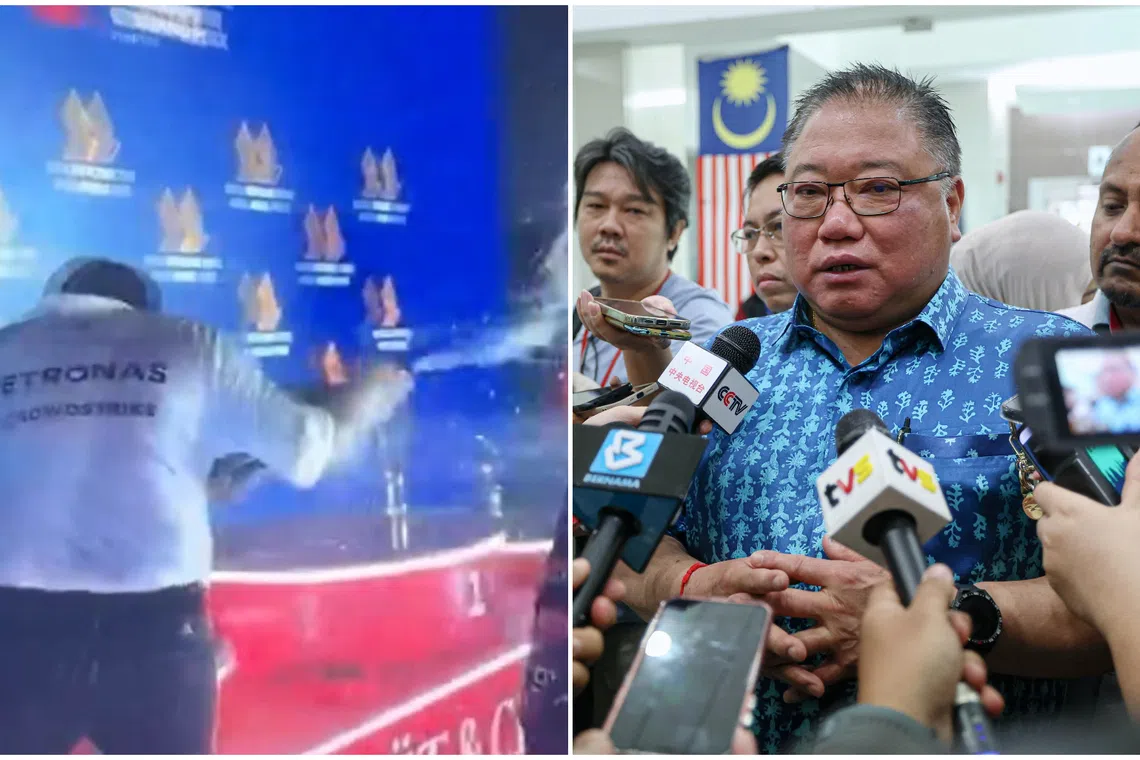Malaysia’s politics shaken and stirred by alcohol controversies
Sign up now: Get insights on the biggest stories in Malaysia

Petronas CEO Tengku Muhammad Taufik (left) had apologised over the champagne-spraying ceremony at the Singapore Grand Prix on Oct 5. Separately, Tourism, Arts and Culture Minister Tiong King Sing explained that alcohol was served only after the official programme on Oct 1 had concluded.
PHOTOS: JOEZALUCHI/X, BERNAMA
Follow topic:
- PM Anwar rebuked a minister for serving alcohol at a government event, which violates policy in the Muslim-majority nation.
- Petronas' CEO has apologised for participating in a champagne-spraying celebration, highlighting sensitivities despite alcohol purchase and consumption being legal for non-Muslims, who make up around 37 per cent of the population.
- Rising religious conservatism, amplified by social media and political competition among Malay parties, fuels controversies over alcohol, reflecting anxieties about "halal purity".
AI generated
KUALA LUMPUR - First, Prime Minister Anwar Ibrahim rebuked a Cabinet minister for allowing alcohol at a government function. Then, the chief of Malaysia’s biggest company Petronas apologised for participating in the Formula One podium celebration
To top it off, a local drinks company withdrew its beer named after a prominent mountain in Sarawak after a lawmaker raised objections, saying the naming of an alcohol product after a state landmark was insensitive to the Muslim-majority constituency.
These events over a span of two months have highlighted once again the deep Malaysian-Muslim sensitivity to alcohol-related issues, even though some are concerned about increasing the racial and religious divide in the country.
They also underline a worrying trend: that politicians are quick to ride on these issues, calling upon the Muslims-under-attack narrative to garner maximum mileage. This was seen when Umno Youth chief Akmal Saleh flogged “the socks printed with the word Allah” issue for months in early 2024.
Dr Phoon Wing Keong, head of the Huayan Policy Institute, a Chinese-Malaysian community think-tank, told The Straits Times: “The Federal Constitution... establishes Islam as the religion of the federation while safeguarding the freedom of other religions.
“However, in recent years, political transitions have disrupted this balance. With Umno losing its dominant position in government and the fragmentation of Malay political parties, segments of the Islamic community have grown anxious and uneasy about their political influence and dominant status.
“They fear the rise of non-Malay groups and liberal forces, leading to heightened sensitivity towards religious issues and ritual practices. The pervasive influence of social media has further intensified this trend,” he added.
First things first. Alcohol consumption is legal in Malaysia, where non-Muslims make up about 37 per cent of the population. Liquor is openly sold in such places as supermarkets, and in eateries that cater to non-Muslim diners.
But alcohol cannot be served at government functions. Also, the sale and marketing of alcohol products are tightly regulated in the states ruled by Islamist-based Parti Islam SeMalaysia (PAS), such as Kelantan and Kedah.
The recent ruckus over alcohol issues started after complaints emerged that wine and beer were served at a Tourism, Arts and Culture Ministry event on Oct 1.
The opposition parties, led by Malay-Muslim parties like PAS and Parti Pribumi Bersatu Malaysia, were quick to attack, pushing aside the explanation by Tourism, Arts and Culture Minister Tiong King Sing that the drinks were served only after the official programme had concluded.
In response, Datuk Seri Anwar said on Oct 7: “The government’s policy is firm. Alcohol must not be served at any official government event.
“We have issued a stern reminder to the minister and the ministry so as not to repeat this mistake. Even though the programme had concluded, it is still completely inappropriate.”
Some politicians such as the Democratic Action Party MP, Mr Lim Lip Eng, have defended Mr Tiong amid calls for his resignation over the controversy.
That controversy was followed by another on Oct 5, involving the chief of Petronas, the national oil and gas company and the country’s most profitable concern by far, who was celebrating the victory of Mercedes-AMG Petronas driver George Russell in the Singapore race.
Petronas president and CEO Tengku Muhammad Taufik issued a public apology after he was seen taking part in a champagne-spraying ceremony on the F1 podium in Singapore. “While I can categorically state I did not consume any alcohol, as a Muslim, I should have been more aware of the sensitivities associated with taking part in such celebrations,” he said in a statement on Oct 7.
Mr Harris Idaham Rashid, Youth information chief of opposition party Bersatu, had earlier slammed Tan Sri Tengku Taufik, calling his actions inappropriate.
“The use of alcohol cannot be normalised in the government or government-linked companies... as a Malay-Muslim corporate leader representing Petronas, he is obliged to leave the podium while the champagne shower is taking place,” he said on Oct 7.
But former law minister Zaid Ibrahim said in a post on X that he felt “sorry” for the Petronas chief.
“He was not drinking champagne... he was celebrating a world-class event where Petronas was a major sponsor; yet he had to apologise,” he wrote on Oct 8. “ We have become a people more obsessed with appearances than ethics (when)... a mere image of wine celebration triggers pious outrage.”
Such episodes have renewed public debate about the role of alcohol in Malaysian public life, a recurring flashpoint in the country’s delicate balancing act between Islamic principles and multicultural coexistence.
These would not be the first, nor the last, of such controversies involving alcohol that have been shaking up politics in Malaysia.
In September, a craft beer named Santubong – after Mount Santubong in Sarawak – was pulled from the market after criticism from the public.
One critic was Santubong MP Nancy Shukri, who posted on her Facebook page on Sept 17 that the naming of an alcoholic drink after Santubong was “clearly insensitive to the Santubong community, the majority of whom are Muslims”.
In July 2024, a Chinese school fund-raising dinner drew condemnation after it was found to have received sponsorship from a brewery. This prompted the Education Ministry to send a reminder about existing guidelines that included a ban on the display and promotion of liquor on school premises.
One analyst noted that Malaysia’s policies reflect the Malay-Muslim majority’s deep concerns with “halal purity”, which shapes attitudes towards alcohol and government practices.
“It is complicated because the majority norm of Malaysia is Malay-Muslim. This is reflected in a government circular that explicitly prohibits alcohol at government events,” said Mr Aziff Azuddin, research director of local think-tank Iman Research, who studies religion and consumption practices.
“Consider that the majority of civil servants are also Malay, which affects how these policies are created,” he told ST.
He said the issue extends beyond legality to questions of purity and contamination that shape Malay-Muslim attitudes toward food and drink.
“I personally think people underestimate how important halal consumption is to Muslims, and that the concern of ‘contamination’ is very real,” he added.
Huayan Policy Institute’s Dr Phoon said: “Malaysian society needs to rebuild a shared consensus and cultivate a renewed national spirit – one that reaffirms inclusivity and diversity, while returning to the constitutional values of balance and accommodation that guided the nation’s founding.”
Sign up for our weekly
Asian Insider Malaysia Edition
newsletter to make sense of the big stories in Malaysia.


